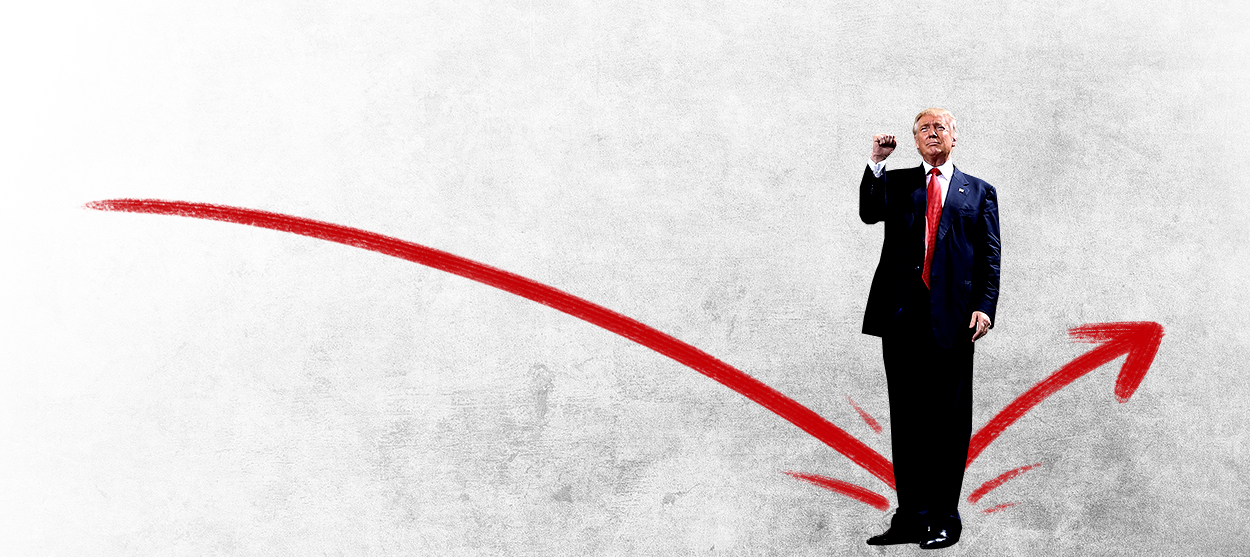Is Trump the low point of conservatism?
As we enter a new decade, conservatives need to consider what they want for the future


A free daily email with the biggest news stories of the day – and the best features from TheWeek.com
You are now subscribed
Your newsletter sign-up was successful
It's been a bad week in Washington. In other news, this is a day ending in "y." As the Democrats prepare to impeach President Trump, the rest of America may be wondering: Have we finally reached the low point? Will the music ever stop in this sickening game of Trumpian limbo?
Liberals will spend the next year trying to recapture the White House. For them, the short-term goals are reasonably clear. For conservatives the picture may be more complicated. Trump's presidency has been fairly excruciating for people who aren't willing to recalibrate their moral compasses with him as the center of gravity. Nevertheless, the GOP seems to be stuck with him at least through 2020. In moments of despondency, it may seem that conservatism is lost beyond recall.
It may not be. When the orange man finally exits stage right, a new era will begin for conservative politics. It's possible that the Republicans might, over time, recover some measure of decency and respectability. This hope will of course seem laughable to many liberals, who can't imagine a way back from Hollywood Access, travel bans, Charlottesville, border separation, Stormy Daniels, Syria withdrawal, the Russia investigation, trade wars with China, and now, quite likely, impeachment. Most of those people probably doubt whether conservatism was ever really respectable. The lofty ideals of Reagan-era conservatives mostly just look to them like a refuge for bitter clingers, warmongers, and self-righteous protectors of privilege. Trump didn't really transform the GOP. He simply pulled away the mask to reveal the rotting flesh beneath.
The Week
Escape your echo chamber. Get the facts behind the news, plus analysis from multiple perspectives.

Sign up for The Week's Free Newsletters
From our morning news briefing to a weekly Good News Newsletter, get the best of The Week delivered directly to your inbox.
From our morning news briefing to a weekly Good News Newsletter, get the best of The Week delivered directly to your inbox.
I think this view is wrong, but it contains elements of truth. Trump did throw a harsh light on the political right's moral failings, and I personally was shocked and chastened by the things he revealed. Still, it's a mistake to see conservatism as nothing more than a mask for reactionary bitterness. The right has a dark side, as we've seen, but conservatives are also capable of great nobility, wisdom, and broad-mindedness. One has to squint quite hard, perhaps, to glimpse this profile in the Fox News weeknight lineup. But politics moves quickly, and an elevated conservatism is still possible, for the United States and for other developed nations.
This needn't even be a far-off dream. The Republicans are a hot mess at the moment, but sometimes reactionary zeal actually helps to inspire a more elevated form of conservatism. Think of Winston Churchill, calling Britain to a principled stand against the rapacious rage of the Third Reich. In our own nation's history, the nativist Know Nothings once helped pave the way to the presidency of Abraham Lincoln. Like a phoenix rising from the ashes, a healthy conservatism can sometimes learn from the mistakes of racists and xenophobes, replacing their mulish resentment with something generous, fruitful, and humane.
What makes the difference? What does it take to convert crazed reactionaries into stalwart defenders of truth and justice? Inspired leaders obviously help, but the most important ingredient here is tradition. Just as a healthy plant needs to be rooted in the right kind of soil, so a healthy conservative requires a tradition that is broad, deep, and appropriately adapted to the climate.
Fundamentally, a conservative is someone who blends a deep respect for the past with a yearning for transcendence. This can be a potent combination. Conservatives are sometimes maligned as "backwards-looking," but realistically, we need people who remember and honor the past. To be fruitful, though, conservatism must be rooted in a tradition that is rich enough to offer wisdom across centuries, through all the vicissitudes of human life. Young-Earth creationists, Biblical literalists, and Holocaust deniers are all examples of people whose traditional commitments have backed them into a dogmatic corner. A broader-minded conservatism should help us to learn from past mistakes, instead of forcing us to repeat them.
A free daily email with the biggest news stories of the day – and the best features from TheWeek.com
What we see in the Trumpian right isn't a flawed tradition. It's what happens when there is no cohesive tradition. Even before Trump's populist revolt, Reaganite Republicanism was growing rusty. Now it's mostly in ruins. Trump is little more than a crude attention-seeker, so Republicanism under his leadership has been a kind of reactionary romp, with different factions vying for the spotlight. As grim as this situation may seem, it could be quite a lot worse. Trump is offensive and divisive, but he isn't disciplined or committed enough to pursue a nefarious agenda. If the right somehow managed to elect a purposeful populist, we might look back nostalgically on bullying tweets and executive temper tantrums.
There are happier possibilities. Conservatives may be able to put their house back in order, but they need to begin by repairing the cracks in their foundation. In short, they need a platform. It must be realistic enough to ground good policy, and inspiring enough to bring tens of millions to the polls. Most Americans don't want to join up with a disgruntled band of men's rights activists, monarchists, back-to-land agrarians, and Bronze Age Perverts. A newly energized conservatism shouldn't even need to waste much energy shushing those people. It should be obvious to all that they're just a fringe element.
In many ways, the old Reaganite compact was really quite inspired. It blended a respect for Judeo-Christian tradition with some elements of classical liberalism. The result was a platform that celebrated virtue, while affirming the value of political and economic freedom. There was a balance to this arrangement that the new right pretty obviously lacks. Relaunching Reaganism is difficult, though. The culture wars have heated up over the past few decades, while the Soviet Union fades into distant memory. Americans no longer cherish their political and economic freedoms in the way we once did. Today's conservatives want to see their politicians shoring up family life, promoting dignified labor, rebuilding community, and rejuvenating culture. They want protection against progressives who seem hostile to their religious traditions. It's hard to champion limited-government ideals when people are looking for political solutions to deep social and spiritual problems.
Moving forward, the right will clearly need to offer more constructive answers to these problems. They need to make ordinary people feel that they and their children can still lead meaningful lives. That does probably mean that Randians will need to move down a few pegs in the party, while the communitarians and natural law Catholics step up. It's not necessarily bad if papal encyclicals enjoy a renewed burst of attention in right-wing circles, while F.A. Hayek moves to the back burner for a few years. In the long run though, it's hard to see how conservatism can stabilize itself without the ballast of some classically liberal commitments. Crown and altar fantasies really can't take root in American soil, and it's foolish to try to save the natal family from Washington when conservative strength is in the heartland. Reaganite Republicanism is the new right's favorite whipping boy, but some sort of limited-government principle will have to be smuggled through a back door. Otherwise, conservatism is likely to grow increasingly irrational and reactionary.
As we enter a new decade, conservatives need to consider what we want for the future. Do we want to focus endlessly on draining the proverbial swamp (which only seems to get murkier by the year)? Or would we prefer to build something?
Want more essential commentary and analysis like this delivered straight to your inbox? Sign up for The Week's "Today's best articles" newsletter here.
Rachel Lu is a writer based in Roseville, Minnesota. Her work has appeared in many publications, including National Review, The American Conservative, America Magazine, and The Federalist. She previously worked as an academic philosopher, and is a Robert Novak Journalism Fellow.
